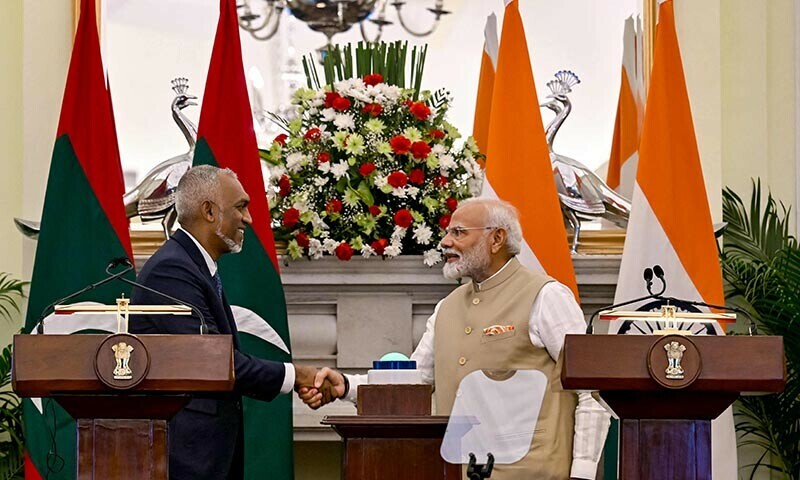
[ad_1]

Maldives President Mohamed Muizzu was given a red carpet welcome on his first state visit to India Monday, a trip Prime Minister Narenda Modi said marked a “new chapter” to reset troubled ties.
Pro-China Muizzu came to power a year ago on a promise to evict dozens of Indian troops deployed in his small but strategically located archipelago.
Most South Asian leaders are invited to New Delhi soon after they assume office, but it has taken almost a year for India to accord Muizzu a state visit.
India however on Monday rolled out a financial support to bolster Male’s struggling economy, with Muizzu and Modi discussing “energy, trade, financial linkages and defence cooperation”, India’s foreign ministry said.
“Your visit is a new chapter in our ties,” Modi told Muizzu, who was given an honour guard including cavalry and a marching band.
“India will always be there for the progress and prosperity of the people of Maldives.” Muizzu, 46, in a speech alongside Modi that included the virtual inauguration of an Indian-supported airport runway and social housing, said he had held “extensive discussions… charting a path for the future collaboration between our two countries”.
He also thanked India for budgetary support “instrumental in addressing foreign exchange issues”, including a 30 billion Indian rupee ($357 million) and $400 million currency swap agreement.
India will also develop the commercial port at Thilafushi to ease the congested port at the island capital Male, and the two nations will begin talks on a potential free trade agreement.
India met Muizzu’s May deadline to withdraw a contingent of 78 soldiers stationed in the Maldives to operate two helicopters and a fixed-wing plane.
However, the aircraft remained and are being operated by a civilian Indian crew.
“What I did is what the people of Maldives asked from me,” Muizzu said, in an interview in the Times of India published Monday.
“Maldives would never do anything that undermines the security of India”, he told the newspaper.
“While we enhance our cooperation with other countries in various sectors, we remain committed to ensuring that our actions do not compromise the security and stability of our region.”
‘Line of credit’
China and India are the two largest bilateral lenders to the Maldives, and the cash-strapped archipelago last month insisted it has no plans to seek an International Monetary Fund bailout after warnings of a possible sovereign default.
Official data showed the Maldives’ foreign debt at $3.37 billion in the first quarter of this year, equating to around 45 percent of gross domestic product.
Muizzu said that a “line of credit arrangement” from India was a “positive step”.
In June, Muizzu travelled to New Delhi for Modi’s inauguration following his victory in a third consecutive election, and India’s Foreign Minister Subrahmanyam Jaishankar travelled to Male in August.
Known as a luxury holiday destination with pristine white sand beaches and secluded resorts, the Maldives has also become a geopolitical hotspot.
India is apprehensive about China’s growing presence in the Indian Ocean.
Global, east-west shipping lanes pass the nation’s chain of 1,192 tiny coral islands, stretching around 800 kilometres (500 miles) across the equator.
India’s government has traditionally regarded the Maldives, as well as neighbouring Sri Lanka, to be within its sphere of influence.
Since coming to power, Muizzu has toned down his anti-Indian rhetoric, and has stated that he would not disrupt the regional balance by replacing Indian forces with Chinese troops.
[ad_2]
Source link






